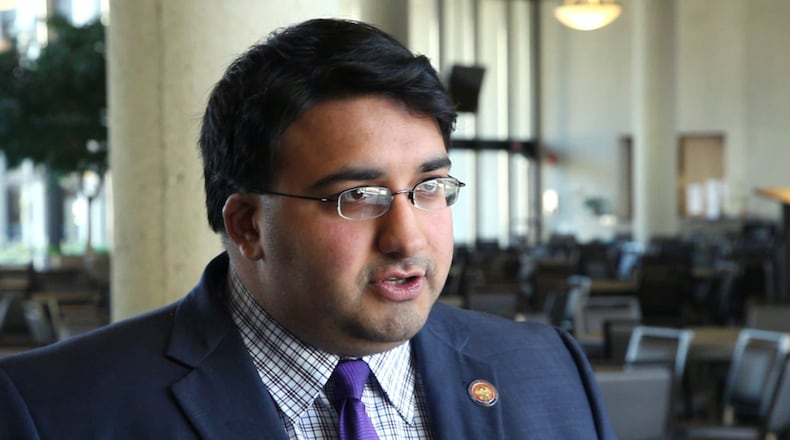O’Neill, a Democrat, announced earlier that he is running for governor in 2018 and that he would recuse himself from considering future cases, but not step down.
On Thursday, in response to Antani’s action, O’Neill issued a statement reiterating his plan to step down once he has officially filed his petitions declaring his candidacy by the Feb. 7 deadline.
RELATED: Ohio Supreme Court Justice recuses himself after controversy
“I have clearly not violated any rules,” O’Neill said. “I have notified the court of a comprehensive and constitutionally permissible plan for my departure from the court when I become a candidate for governor.”
Campaign spokesman Christopher Clevenger said O’Neill has not asked for an opinion from either the Ohio Board of Professional Conduct or the Court of Appeals Judges Association, which has the power to hear and act on any complaints about a justice or supreme court candidate violating the Ohio Judicial Code of Conduct.
The code states that “upon becoming a candidate in a primary or general election for a nonjudicial elective office, a judge shall resign from judicial office.”
O’Neill contends he will not officially become a candidate until he files petitions declaring his candidacy, which must have the signatures of 1,000 valid registered voters.
Clevenger did not know if a complaint has been filed against O’Neill with the appeals court judges association but said O’Neill has not yet been summoned by the House Sergeant-at-Arms to appear before the House, as called for in Antani’s resolution.
Antani’s action threatens the independence of the judiciary, which has a process for removing a justice from the court, said David Pepper, chairman of the Ohio Democratic Party.
RELATED: Ohio Chief Justice issues warning to Justice O’Neill after he announces run for governor
“This feels like what Donald Trump would do,” Pepper said. “In a normal democracy when you have a separation of powers, you aren’t used to people taking this step.”
Antani said the constitution allows for the legislature to remove a sitting justice.
“I’m a big believer in checks and balances. I’m a big believer that the judiciary must be fair and independent,” Antani said. “Not only has he declared as a candidate for governor but he’s released what he calls the ‘O’Neill Plan for Ohio.’ He has taken positions on 15 or so different partisan issues.”
O’Neill said his “announcement included a meaningful plan to address the opioid epidemic sweeping the state of Ohio, something the Ohio Legislature has failed to do. I can understand why some members of the Ohio General Assembly do not want me to be governor.”
Under the state constitution, a complaint must be filed with the clerks of the House and Senate and then a summoning resolution must be introduced — two steps Antani said he took Thursday.
RELATED: Who is running for governor in Ohio?
“If that summoning resolution is passed, Justice O’Neill will be summoned to a joint session of the House and Senate where he will be asked to answer himself of whether he violated the judicial code of conduct or not. If the General Assembly finds that he has, I will introduce another resolution that is removing him. If we pass that resolution, then he will be removed,” Antani said.
Antani said he was unaware that there is a judicial process for removing Supreme Court justices. Even so, Antani said the legislature has the constitutional ability to do it as well.
Any citizen can file a complaint with the appeals judges association alleging a violation of the judicial code. The judges would appoint a hearing panel made up of trial judges to hear evidence and determine if a violation occurred. That finding can be appealed to a panel of 12 appellate judges.
Punishment can include a reprimand, suspension of the person’s law license or disbarment. Suspension or disbarment would, by definition, lead to suspension or removal of the judge from the court because a law license is required for the job.
The process is rarely used, and the last time it was involved O’Neill during his 2012 run for the Supreme Court. The five-judge hearing panel ruled against O’Neill - then a retired appellate judge - and ordered him to cease calling himself “judge” on campaign literature. That ruling was overturned on appeal.
“While I don’t appreciate GOP legislators using state time to score political points, I’m frustrated that Justice O’Neill did not think through these potential consequences before entering the race,” said state Sen. Joe Schiavoni, D-Boardman, who is also running in the Democratic primary for governor.
The other Democrats are Dayton Mayor Nan Whaley, former state representative Connie Pillich of Cincinnati, and former U.S. Rep. Betty Sutton of Akron.
On the Republican side the announced candidates are Ohio Attorney General Mike DeWine, Secretary of State Jon Husted, U.S. Rep. Jim Renacci of Wadsworth and Lt. Gov. Mary Taylor.
Staff writer Will Garbe contributed to this report.
Other stories by Lynn Hulsey
RTA to buy 26 electric trolley buses — at $1.2 million each
Want to avoid getting hacked while driving? Check this out
Debate focuses on Guns At Work



